PASCAL'S TRIANGLE AND THE BINOMIAL THEOREM
Subscribe to our ▶️ YouTube channel 🔴 for the latest videos, updates, and tips.
A binomial expression is the sum, or difference, of two terms.
For example,
x + 2, 2x + 3y, p - q
We may already be familiar with the need to expand brackets when squaring such quantities.
We will know, for example, that
(x + 3)2 = (x + 3)(x + 3)
(x + 3)2 = x2 + 3x + 3x + 9
(x + 3)2 = x2 + 6x + 9
If we want to raise a binomial expression to a power higher than 2.
For example if we want to find (x + 3)7, it is bit difficult to do this by repeatedly multiplying (x + 3) by itself.
In this section, we will learn how a triangular pattern of numbers, known as Pascal’s triangle, can be used to obtain the required result very quickly.
Pascal's Triangle
We can form a Pascal's triangle using the steps explained below.
Step 1 :
We start to generate Pascal’s triangle by writing down the number 1.
Then we write a new row with the number 1 twice :

Step 2 :
We then generate new rows to build a triangle of numbers. Each new row must begin and end with a 1 :
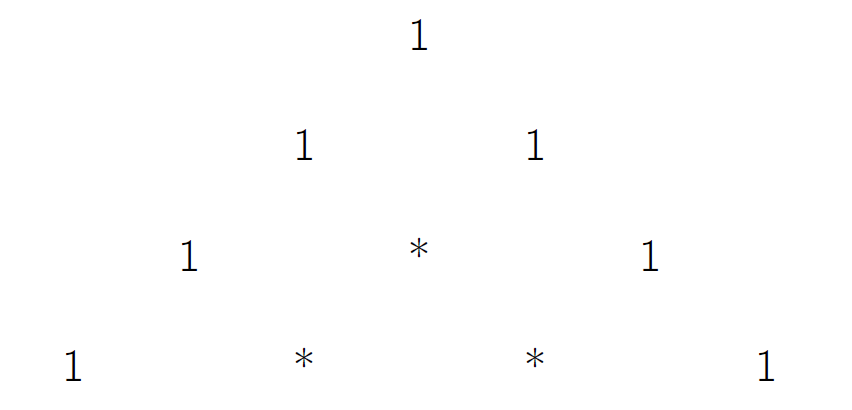
Step 3 :
The remaining numbers in each row are calculated by adding together the two numbers in the row above which lie above-left and above-right.
So, adding the two 1’s in the second row gives 2, and this number goes in the vacant space in the third row :
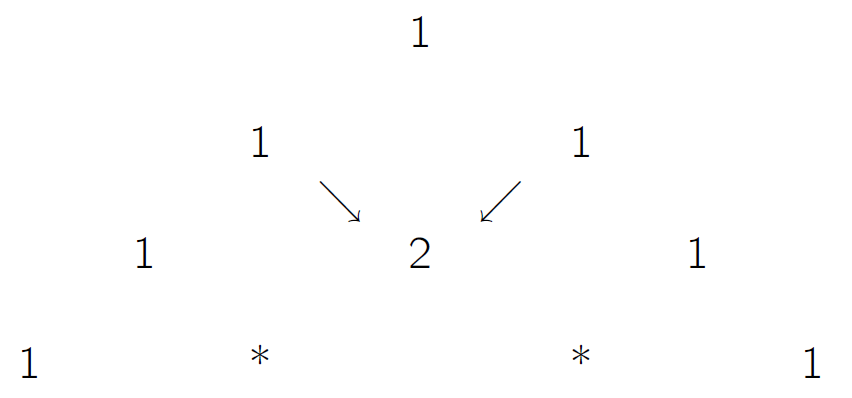
Step 4 :
The two vacant spaces in the fourth row are each found by adding together the two numbers in
the third row which lie above-left and above-right :
1 + 2 = 3 and 2 + 1 = 3
This gives :
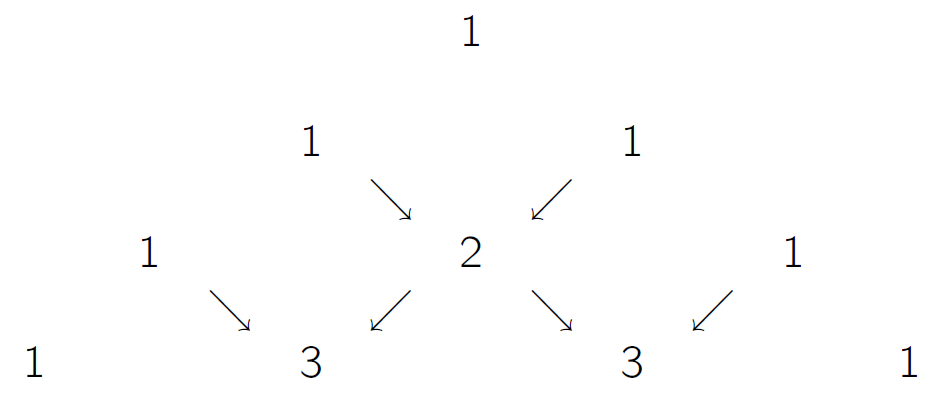
Step 5 :
We can continue to build up the triangle in this way to write down as many rows as we wish.
The diagram below shows the first six rows of Pascal’s triangle.
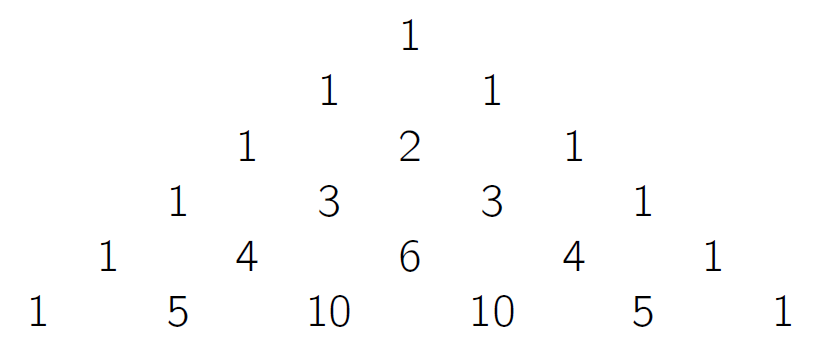

Pascal Triangle and Exponent of the Binomial
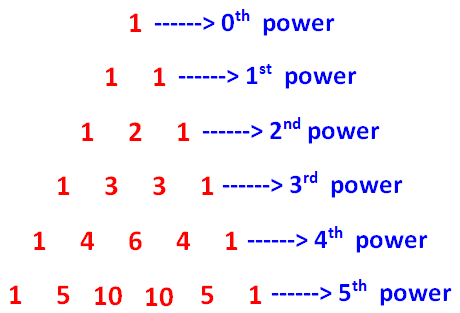
To understand pascal triangle algebraic expansion, let us consider the expansion of (a + b)4 using the pascal triangle given above.
How to Get Expansion of (a + b)⁴ Using Pascal Triangle
In (a + b)4, the exponent is '4'.
So, let us take the row in the above pascal triangle which is corresponding to 4th power.
That is,
1 4 6 4 1
General Rule :
In pascal expansion, we must have only 'a' in the first term, only 'b' in the last term and 'ab' in all other middle terms.
If we are trying to get expansion of (a + b)n, all the terms in the expansion will be positive.
Note :
This rule is not only applicable for power '4'.
This rule is applicable for any value of 'n' in (a + b)ⁿ.
It has been clearly explained below.
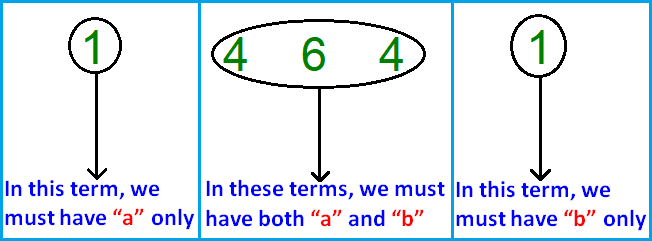
Now we have to follow the steps given below.
Step 1 :
In the first term, we have to take only 'a' with power '4' [This is the exponent of (a + b)].
Then, the first term will be a4.
Step 2 :
In the second term, we have to take both 'a' and 'b'.
For 'a', we have to take exponent '1' less than the exponent of 'a' in the previous term.
For 'b', we have to take exponent '1'.
Then, the second term will be a3b.
Step 3 :
In the third term also, we have to take both 'a' and 'b'.
For 'a', we have to take exponent '1' less than the exponent of 'a' in the previous term.
For 'b', we have to take exponent '2'.
Then, the second term will be a2b2.
(We have to continue this process, until we get the exponent '0' for 'a')
Step 4 :
When we continue the process said in step 3, the term in which we get exponent '0' for 'a' will be the last term.
In the last term, we will have only 'b' with power '4' [This is the exponent of (a + b)].
Then, the last term will be b4.
The four steps explained above given in the picture below.
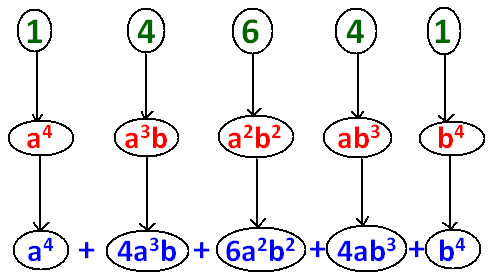
Finally the expansion is,
(a + b)4 = a4 + 4a3b + 6a2b2 + 4ab3 + b4
How to Get Expansion of (a - b)⁴ Using Pascal Triangle
General Rule :
If we are trying to get expansion of (a - b)n, we have to take positive and negative signs alternatively staring with positive sign for the first term.
Note :
This rule is not only applicable for power '4'. This rule is applicable for any value of 'n' in (a - b)n.
To get expansion of (a - b)4, we do not have to do much work.
As we have explained above, we can get the expansion of (a + b)4 and then we have to take positive and negative signs alternatively staring with positive sign for the first term
So, the expansion is
(a - b)4 = a4 - 4a3b + 6a2b2 - 4ab3 + b4
In this way, using pascal triangle to get expansion of a binomial with any exponent.
Solved Problems
Expand the following binomials using pascal triangle :
Problem 1 :
(3x + 4y)4
Solution :
Already, we know
(a + b)4 = a4 + 4a3b + 6a2b2 + 4ab3 + b4
Comparing (3x + 4y)4 and (a + b)4, we get
a = 3x and b = 4y
Substitute a = 3x and b = 4y in the expansion of (a + b)4
(3x + 4y)4
= (3x)4 + 4(3x)3(4y) + 6(3x)2(4y)2 + 4(3x)(4y)3 + (4y)4
= 81x4 + 4(27x3)(4y) + 6(9x2)(16y2) + 4(3x)(64y3) + 256y4
= 81x4 + 432x3y + 864x2y2 + 768xy3 + 256y4
Problem 2 :
(x - 4y)4
Solution :
Already, we know
(a - b)4 = a4 - 4a3b + 6a2b2 - 4ab3 + b4
Comparing (x - 4y)4 and (a - b)4, we get
a = x and b = 4y
Substitute a = x and b = 4y in the expansion of (a - b)4.
(x - 4y)4 = x4 - 4(x3)(4y) + 6(x2)(4y)2 - 4(x)(4y)3 + (4y)4
= x4 - 16x3y + 6(x2)(16y2) - 4(x)(64y3) + 256y4
= x4 - 16x3y + 96x2y2 - 256xy3 + 256y4
Subscribe to our ▶️ YouTube channel 🔴 for the latest videos, updates, and tips.
Kindly mail your feedback to v4formath@gmail.com
We always appreciate your feedback.
About Us | Contact US | Privacy Policy
©All rights reserved. onlinemath4all.com
Recent Articles
-
10 Hard SAT Math Questions (Part - 39)
Dec 11, 25 05:59 PM
10 Hard SAT Math Questions (Part - 39) -
10 Hard SAT Math Questions (Part - 38)
Dec 08, 25 12:12 AM
10 Hard SAT Math Questions (Part - 38) -
SAT Math Practice
Dec 05, 25 04:04 AM
SAT Math Practice - Different Topics - Concept - Formulas - Example problems with step by step explanation

